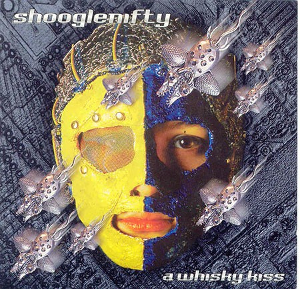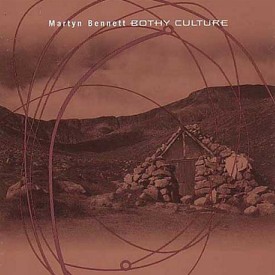Tony McManus is a guitarist from Paisley, Scotland, who plays finger-style acoustic guitar arrangements of tunes from Celtic music, classical music, and other genres. He emigrated from Scotland to Canada in 2003.
Greentrax Recordings are a Scottish record label that specialises in Scottish traditional music.

Covers is the eighth studio album by English acoustic roots duo Show of Hands. The album was released in 2000 by the duo's own label Hands on Music. The album exclusively features cover versions of thirteen songs by the duo, chosen and recorded to reflect the band's contemporary musical influences. As such, the album contains no Steve Knightley compositions. The album was recorded over two days in Chudleigh Town Hall, Devon, with producer Gerald O'Farrell, and features only "straight performances", with its songs being untouched by post-production or techniques such as overdubbing or double tracking, presenting a "live" sound. The album followed their limited edition release Folk Music (1998), which featured the band's versions of traditional folk songs, and was the duo's first array into creating an album of music without Knightley compositions.

The Peatbog Faeries are a largely instrumental Celtic fusion band. Formed in 1991, they are based in Dunvegan on the Isle of Skye, Scotland.
Celtic fusion is an umbrella term for any modern music which incorporates influences considered "Celtic", or Celtic music which incorporates modern music. It is a syncretic musical tradition which borrows freely from the perceived "Celtic" musical traditions of all the Celtic nations, as well as from all styles of popular music, it is thus sometimes associated with the Pan-Celtic movement. Celtic fusion may or may not include authentic traditional music from any one tradition under the Celtic umbrella, but its common characteristic is the inspiration by Celtic identity.

Solar Shears is the third studio album and fourth album overall by Scottish Celtic fusion band Shooglenifty. After the critical acclaim given to their underground second album A Whisky Kiss (1996), the band left Greentrax Recordings and signed to Vertical Records in the UK and Compass Records in the US and hired long time producer Jim Sutherland to produce their new album. The album sees the band expand their self-described "acid croft" sound, featuring a wide range of musical influences such as worldbeat, Eastern music, African music, psychedelic music, bluegrass, breakbeat and techno fused with a traditional Scottish Celtic music sound. With this album, Sutherland introduced many unorthodox approaches to the band's music, including looped beats, scratching, electro-atmospherics and sampled 'discovered sounds' from industrial clanks and rumbles to snatches of telephone conversation and recorded pelican crossing announcements.

A Whisky Kiss is the second studio album by Scottish Celtic fusion band Shooglenifty. After releasing their first album Venus in Tweeds in 1994, the band toured, and then began work on A Whisky Kiss in late 1995. Some of the album's tracks were premiered in early 1996 ahead of its release. The album combines the band's Scottish Celtic music with genres such as worldbeat and techno. The band described the album as "acid croft", whilst one reviewer termed it a unique variation of Celtic rock.

Malinky is a Scottish folk band specialising in Scots song, formed in autumn 1998.

Faerie Stories is the second album by Scottish Celtic fusion group Peatbog Faeries, released in 2001 on Greentrax Recordings. The album was reissued in 2008 as a digipack. The album is large departure from the sound of their début album Mellowosity (1996), and sees the band explore a largely electronic sound mixed with their traditional Celtic fusion sound. Influences of electronic genres such as electronica, house, dubtronica and trip hop, in addition to even dub music and African music can be heard on the album fused with traditional Scottish Celtic music.

Welcome to Dun Vegas is the third album by Scottish Celtic fusion group Peatbog Faeries, released in July 2003 as the first release on the band's own Peatbog Records label. The album was recorded in a cottage on the banks of Pool Roag, near Dunvegan, on the Isle of Skye. Following the electronic-infused Faerie Stories (2001), Dun Vegas was co-produced between Calum MacLean and the band's drummer Iain Copeland. The album is experimental, mixing traditional and modern Celtic music with other genres and styles such as African music and electronica and featuring experimental effects including backwards drumming and a track based around a kitchen cooker timer.

Croftwork is the fourth album by Scottish Celtic fusion group Peatbog Faeries, recorded in Roag on the Isle of Skye, and released in 2005 on the band's own Peatbog Records label. It was released as the label's second album following on from the band's previous album Welcome to Dun Vegas (2003). They recorded the album at Phat Controller Productions on the band's native Isle of Skye.

Otherworld is an album by Lúnasa that was released 1999 on Green Linnet Records. It is the band's second major release. Although the album displays the band’s traditional Celtic sound, it features techniques and styles unusual to the genre, such as occasional double-tracking recording and occasional instances of instruments that differ from Celtic music, such as cello, electric bass and flügelhorn, leading Allmusic to say the album "yields a sound that is unique to the group and yet clearly in touch with tradition". The album has been described as innovative, with The Georgia Straight citing several tracks' usage of multiple woodwinds as an example.

What Men Deserve To Lose is the fifth album by Scottish Celtic fusion group Peatbog Faeries, recorded at Skye Recording in Roag on the band's native Isle of Skye in 2007, and was commercially released on 16 July 2007 on the band's own label Peatbog Records, though the album had been sold at festivals, and from the band's website, since 22 June 2007. It is the band's first album to feature Graeme Stafford, who brings what the band described as a "dancey" feel to the album.

Bothy Culture is the second studio album by the Scottish Celtic fusion artist Martyn Bennett, released in October 1997 on the Rykodisc label. After winning critical acclaim for his debut album Martyn Bennett (1996), Bothy Culture builds upon that album's mixing of Scottish Celtic music with farther, international folk music styles and contemporary electronic music. The album celebrates and draws upon the music of Bennett's native Gaeldom as well as the music of Islam and Scandinavia, with Bennett finding and emotionally connecting to the similarities between the geographically dispersed styles. It mixes the styles with contemporary electronic music such as breakbeat and drum and bass.

Seven is the fifth studio album by the Scottish Celtic rock band Wolfstone. After the release of the band's previous album The Half Tail in 1996, numerous members left the band, and due to poor management, the band "split up" in 1998 after the band's label Green Linnet Records released an unrelated side-project as the Wolfstone album This Strange Place in early 1998. However, still contractually obliged to record another album for Green Linnet Records, the remaining members of the band regrouped chose to write and record the required album with full attention, rather than make a "half-hearted" album. Bassist Wayne Mackenzie said "we could have just gone through the motions and made a half-hearted attempt at an album, but we didn’t. The band and our fans mean far too much to us to do that." Titling the album Seven after where the album sits in the band's canonical album sequence, the album style was described as a particularly rock-edged variation of Celtic rock, although it does feature some mellower tracks. The album contains a mix between songs and instrumentals and diverse subject matter.

Dust is the sixth studio album by the Scottish Celtic fusion band Peatbog Faeries, released on 8 August 2011 on Peatbog Records, although pre-release copies were released on 20 July 2011 through the band's online shop. Following the band's 2008 tour and subsequent live album, the band's fiddle player Adam Sutherland and drummer Iain Copeland left the band, replaced by Peter Tickell and Stu Haikney respectively whose experience helped stir the band in a new direction. The band set to record Dust in 2011 with longtime producer Calum MacLean, beginning work in Orbost and concluding work at Cumbernauld College. Haikney brought experimental fiddle techniques to the band, and similarly experimental production techniques, whilst the entire band experimented with various genres of music including African music, funk, reggae, ambient music and electronic music alongside the band's traditional Celtic fusion sound. The brass sound of previous albums also returned. The album was also an attempt to translate the band's live sound to studio work.

Live is the first live album by Scottish celtic fusion band Peatbog Faeries, released in 2009 by Peatbog Records. It is a compilation album of live tracks from two of the band's concerts in their 2008 tour, and is the band's first album to have been released in a digipak.

Blackhouse is the seventh studio album by Scottish celtic fusion band Peatbog Faeries, released in May 2015 by the band's label Peatbog Records. After recording their acclaimed album Dust (2011), the band played live for the following few years, during which time fiddler Peter Tickell left the band, to be replaced by Ross Couper. As the band had not recorded an album for some years, they returned to record Blackhouse mainly in a cottage in Kilchoan, Ardnamurchan during 2014, although recording continued into 2015. Their first album with Touper, and their first without a brass section since Welcome to Dun Vegas (2003), Blackhouse was produced by Calum MacLean and displays a very eclectic array of genres, fusing the band's Scottish celtic roots with genres such as jazz, funk, reggae, dance and house.

Zoë Bestel is a Scottish singer-songwriter, who describes her music as Nu-Folk. She started learning the Ukulele in 2011 and released her first EP in 2012. Bestel has released two albums, been nominated for the Scottish Alternative Music Awards under the Best Acoustic category and supported artists such as Nathan Connolly of Snow Patrol, Emily Smith, The Paul McKenna Band, The Peatbog Faeries, Erin Rae, Chris Wood, Paul Brady, Steve Tilston and Bella Hardy.
Valtos is an electronic Celtic fusion duo based on the Isle of Skye. Their name comes from the village of the same name, close to Staffin on Skye.

















